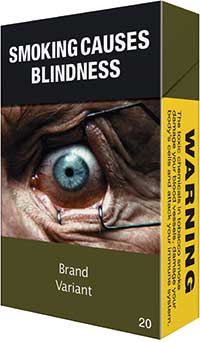AS reported in Scottish Grocer, proposed moves to plain packs for tobacco products (or standardised packaging as it’s often called) no longer appears to be plain sailing for those in government and the pressure groups who support such a policy.
 After what’s known as the Chantler Review (a study carried out by paediatrician Sir Cyril Chantler at the request of the Westminster Government) concluded that the introduction of standardised packaging as part of a comprehensive programme of tobacco controls “would be very likely over time to contribute to a modest but important reduction in smoking prevalence especially in children and young adults” it appeared likely that a consultation would begin in April this year. And many observers expected legislation designed to introduce plain packs to be launched soon after the consultation was complete.
After what’s known as the Chantler Review (a study carried out by paediatrician Sir Cyril Chantler at the request of the Westminster Government) concluded that the introduction of standardised packaging as part of a comprehensive programme of tobacco controls “would be very likely over time to contribute to a modest but important reduction in smoking prevalence especially in children and young adults” it appeared likely that a consultation would begin in April this year. And many observers expected legislation designed to introduce plain packs to be launched soon after the consultation was complete.
But no consultation has begun. And the chair of the Westminster Parliament’s All-Party Committee on Small Shops, Priti Patel MP, has written to UK health secretary Jeremy Hunt to say the introduction of plain packs would be a blunt instrument that would have a significant effect on retailers.
And a number of tobacco-producing countries have taken action against the plain pack rules in Australia and proposed elsewhere under the rules of the World Trade Organisation.
Tobacco firms are continuing their own argument against the introduction of standardised packaging, arguing both that it deprives them rights of intellectual property and that the policy will do little or nothing to reduce smoking rates or uptake but will instead play into the hands of illicit traders such as smugglers and counterfeiters.
Colin Wragg, Imperial Tobacco’s UK head of corporate & legal affairs said of Australia’s plain packs policy: “Since its introduction illicit trade has increased from 11.8% to 13.3% of total consumption.”




















